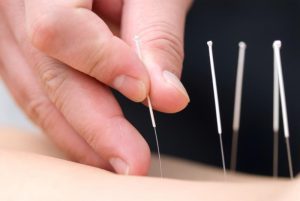Are there any alternative therapies that could help my eczema?
 ESC asked Chicago-based dermatologist Dr. Peter Lio to share his expertise on this topic. Dr. Peter Lio is not only a practicing dermatologist and the director of the Chicago Integrative Eczema Center, but he also has an interest in integrative medicine and is a trained acupuncturist.
ESC asked Chicago-based dermatologist Dr. Peter Lio to share his expertise on this topic. Dr. Peter Lio is not only a practicing dermatologist and the director of the Chicago Integrative Eczema Center, but he also has an interest in integrative medicine and is a trained acupuncturist.
“Patients are often interested in alternative treatments for eczema. We may ask why patients seek alternative treatments. Patients seek alternatives when diseases are not curable when treatments are ineffective or felt to be unsafe, and when treatments seem to only manage but not eliminate symptoms. Eczema is difficult to manage and there is no cure, and this drives patients to seek other methods of management. For example, few people with a broken bone seek Reiki treatment – most get a cast and the bone heals. Eczema management is challenging. The disease continues to flare, which drives patients to seek additional information. Patients want to know what is causing the condition and how they can fix it.
Interest in alternative medicine in eczema treatment is common, and I would estimate that at least 50% of patients have tried some form of alternative medicine to manage their condition.
Here are some common alternative therapies of interest in eczema:
Sunflower seed oil can naturally boost the skin’s ability to make ceramide fats (fats essential for skin hydration and improved skin barrier) and a small study has shown that it may help to reduce skin thickening that occurs in eczema patients after long-term scratching.
Another small study compared olive oil and sunflower oil and demonstrated that olive oil increased redness and decreased the skin barrier integrity, while sunflower oil showed benefits. It should be noted that sunflower oil has not been tested or studied for use on the skin for a long period of time, so we do not have data to show that it is safe when applied to skin. There is also potential for allergic sensitization (i.e. causing an allergy) when food products are applied to the skin so caution should be used.
Coconut oil is used by some eczema patients to moisturize the skin. It should be noted that this is not just any type of coconut oil; we are referring to Extra Virgin or Cold Pressed Coconut Oil – which is a cleaner and better version of coconut oil. An American study of 117 children with atopic dermatitis compared the application of coconut oil and mineral oil. The results showed that the group using coconut oil did significantly better than the group who used mineral oil, including improved disease and a decrease in infection. Again, there is theoretical risk of allergic sensitization to foods after applying these foods to the skin. While this is potentially exciting news, and we need to learn more, we do have to be careful with food and plant products being applied to the skin in terms of potential for allergy.
Aloe vera has been used for a very long time to soothe the skin, but it has never been studied in atopic dermatitis and eczema. Some patients may find it helpful, however, it comes in many vehicles so exercise caution. For example, aloe vera in cream or gel forms may contain preservatives and other ingredients that could potentially cause irritation to the skin.
Massage therapy was studied in a small group of children with atopic dermatitis. All of the children in the study received an application of moisturizer, but half received a daily massage to apply the moisturizer. The groups who received the daily massage by their parents had significant improvement in their atopic dermatitis.
Acupuncture may be helpful in managing the itch of eczema. I performed a small study using acupressure (massaging an acupuncture point) in patients with atopic dermatitis and found a helpful effect for itch, but the study was very small and did not have a true placebo control, so must be interpreted with great caution. Importantly, acupuncture or acupressure are unlikely to harm patients.
Vitamins and supplements have not been shown to improve eczema convincingly and there is potential risk when taking large doses of vitamins and supplements. Vitamin D supplementation has at least a solid body of helpful studies, but because there are also studies showing no effect, many have not yet adopted recommending Vitamin D. Probiotics are also a complex area that have both positive and negative studies. On balance, there is some evidence that probiotics may help prevent atopic dermatitis when given to expectant mothers and infants, but again the evidence is sparse so wide adoption has not occurred.”
ESC thanks Dr. Peter Lio for his contributions to this article. Dr. Lio is a dermatologist based in Chicago, Illinois, and is an Associate Professor of Dermatology, Feinberg School of Medicine, North Western University, Chicago. Learn more about Dr. Lio at www.chicagoeczema.com
Disclaimer: Information provided in this resource does not constitute medical advice and is not intended to be used as a diagnostic tool. The information is up-to-date at time of publication. All medications, interventions, and treatment plans have risks and benefits, and it is important that individuals discuss their or their child’s specific health care needs with a qualified health care professional.
July 2020



